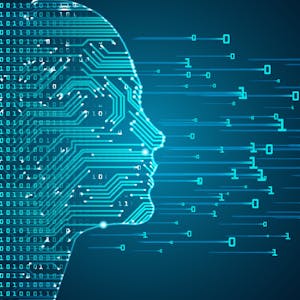Introduction to Deep Learning
Deep Learning is the go-to technique for many applications, from natural language processing to biomedical. Deep learning can handle many different types of data such as images, texts, voice/sound, graphs and so on. This course will cover the basics of DL including how to build and train multilayer perceptron, convolutional neural networks (CNNs), recurrent neural networks (RNNs), autoencoders (AE) and generative adversarial networks (GANs). The course includes several hands-on projects, including cancer detection with CNNs, RNNs on disaster tweets, and generating dog images with GANs.Prior coding or scripting knowledge is required. We will be utilizing Python extensively throughout the course. We recommend taking the two previous courses in the specialization, Introduction to Machine Learning: Supervised Learning and Unsupervised Algorithms in Machine Learning, but they are not required. College-level math skills, including Calculus and Linear Algebra, are needed. Some parts of the class will be relatively math intensive.
This course can be taken for academic credit as part of CU Boulder’s Master of Science in Data Science (MS-DS) degree offered on the Coursera platform. The MS-DS is an interdisciplinary degree that brings together faculty from CU Boulder’s departments of Applied Mathematics, Computer Science, Information Science, and others. With performance-based admissions and no application process, the MS-DS is ideal for individuals with a broad range of undergraduate education and/or professional experience in computer science, information science, mathematics, and statistics. Learn more about the MS-DS program at https://www.coursera.org/degrees/master-of-science-data-science-boulder
.
Course logo image by Ryan Wallace on Unsplash.
Apply different optimization methods while training and explain different behavior.
Use cloud tools and deep learning libraries to implement CNN architecture and train for image classification tasks.
Apply deep learning package to sequential data, build models, train, and tune.
Syllabus
Syllabus - What you will learn from this course
Week 1
Deep Learning Introduction, Multilayer Perceptron
Week 2
Training Neural Networks
Week 3
Deep Learning on Images
Week 4
Deep Learning on Sequential Data
Week 5
Unsupervised Approaches in Deep Learning
FAQ
When will I have access to the lectures and assignments?
Access to lectures and assignments depends on your type of enrollment. If you take a course in audit mode, you will be able to see most course materials for free. To access graded assignments and to earn a Certificate, you will need to purchase the Certificate experience, during or after your audit. If you don't see the audit option:
What will I get if I subscribe to this Specialization?
When you enroll in the course, you get access to all of the courses in the Specialization, and you earn a certificate when you complete the work. Your electronic Certificate will be added to your Accomplishments page - from there, you can print your Certificate or add it to your LinkedIn profile. If you only want to read and view the course content, you can audit the course for free.
Is financial aid available?
Yes. In select learning programs, you can apply for financial aid or a scholarship if you can’t afford the enrollment fee. If fin aid or scholarship is available for your learning program selection, you’ll find a link to apply on the description page.
Reviews
